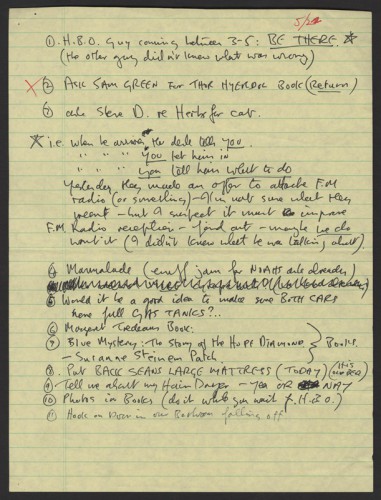

A few items were added to my New Year’s to-do list in a Bible study last week:
‘But I say to you that listen, Love your enemies, do good to those who hate you, bless those who curse you, pray for those who abuse you. If anyone strikes you on the cheek, offer the other also; and from anyone who takes away your coat do not withhold even your shirt. Give to everyone who begs from you; and if anyone takes away your goods, do not ask for them again. Do to others as you would have them do to you.
‘If you love those who love you, what credit is that to you? For even sinners love those who love them. If you do good to those who do good to you, what credit is that to you? For even sinners do the same. If you lend to those from whom you hope to receive, what credit is that to you? Even sinners lend to sinners, to receive as much again. But love your enemies, do good, and lend, expecting nothing in return. Your reward will be great, and you will be children of the Most High; for he is kind to the ungrateful and the wicked. Be merciful, just as your Father is merciful.’ (Luke 6:27-36)
There are a few things here which are difficult; for instance, when the Salvation Army bellringers were out a few weeks ago to ask me for a few dollars, I was generally too stingy to oblige, let alone to give my shirt, too. It’s an overwhelming amount of commands.
 To-do lists help us by arranging certain tasks in sequence so we can focus on one and bracket out the others. If I tried to keep every task of the day equally on my mind at once, it would likely lead to a panic attack after a few months (or hours). To reduce a long list to a sequence of manageable tasks gives us a much-needed sense of control which is vital to getting everything done.
To-do lists help us by arranging certain tasks in sequence so we can focus on one and bracket out the others. If I tried to keep every task of the day equally on my mind at once, it would likely lead to a panic attack after a few months (or hours). To reduce a long list to a sequence of manageable tasks gives us a much-needed sense of control which is vital to getting everything done.
The commands above do not follow the practical logic of sequestering certain manageable parts. A sermon preached on this passage will often focus on the virtue of generosity (shirt too), forgiveness (pray for those), endurance, agape, and so forth. It would be nice to include all of them in the sermon, but that would feel scattershot, lacking focus, as well as being overwhelming – just do what you can, focus on one thing at a time. Jesus doesn’t really do this, either, on this famous sermon and/or collection of sayings ‘on the plain’.
There is no sequestering into manageable sections, and no long-winded discourses on this virtue or that one. I can think of two (conflicting) possible reasons why: (1), Jesus and Luke only intended to present a foundation on which a detailed exposition of Christian ethics could be built, and (2) we weren’t quite meant to do the kind of inspirational virtue-parsing which we find in many pulpits.
But this isolation of different elements of Christ’s, as well as St. Paul’s, moral teaching seems ubiquitous. If Christianity’s common idea of sin as a function of pride is true, the criteria for which teachings we respect seem obvious: I place undue importance on the commands I abide by, and we all place undue importance on things we think we can control. For instance, when I was an outlier for not drinking in high school, “Wine is a mocker and beer a brawler! It says it crystal-clearly in Proverbs!” and later, “Wow, the Bible’s teachings on alcohol are really, really spare – I think moral problems as obscure as grabbing a falling Ark of the Covenant (2 Sm 6) might loom larger.” The impetus is clear: by emphasizing a command I mostly keep I both inflate my own obedience and render the other commands – which I don’t keep as well – relatively less important, deflating my dis-obedience. Such selectivity can be illuminating: think about the first commands that come to your mind when you think of ‘God’s Law’, and they’re probably sources of pride and judgmentalism for you/me.
It is, of course, human; it’s impossible to keep all of the Bible’s various moral teachings before us at any one time. Selectivity must happen, and the criteria for such selection will always be pride-driven, at least in part. But it is also a defense mechanism, dividing up righteousness into manageable, seemingly do-able parts.
For the commands we do not keep well, another common defensive device is minimization, bringing the Law down to a level we can keep. So people read the rich young ruler story (“sell all you have and give it to the poor”) with something like, ‘whatever’s most important to you, whatever’s your idol, prayerfully give it over to God.’ But there are at least two or three churches, in most large-ish towns, where the most congregationally-appropriate reading of the passage would be the literal, highly-unpleasant one.
Or another common deflection: “give to everyone who begs of you” we take to mean roughly, “insofar as you can, with discernment, give more than you’re naturally inclined to. But you have your life to live, too, and you also don’t want to be an enabler.” What’s missed here is that the thrust of Christian morality, in the first few generations after Jesus, inclined toward martyrdom: the shape of Christian witness did not consist in using one’s power and influence to further the Gospel but rather to give up that power and influence, to make an example through the utter surrender of one’s personal rights, property, space, boundaries, and so forth.
That is to say, the shape was cruciform: a surrendering of the total self, and especially one’s pride, before the overawing command of God. The Church’s shape, too, followed this pattern – especially in Jerusalem – in its early phase. Criticisms of self-righteousness and judgmentalism now make perfect sense; someone who has received the law in a manageable to-do list, with little piecemeal virtues gradually acquired, of course becomes so inured to a can-do mentality that they, the trespassers, must totally lack willpower or righteousness. And this can-do mentality is self-reinforcing: it incentivizes progressively more comprehensive defense-mechanisms until one’s shortcomings become almost impossible to think.
But what seemed offensive about Jesus was his tendency to associate with the lowest elements of society, his breaking of the Sabbath, and his strange tendency to skip over moral issues coupled with his utterly unyielding sermons on the mount and plain. Moralism and overconfidence in human ability are apparent in a community or person whenever someone seems offended by these or analogous problems, and they’re blisteringly obvious whenever the Pharisaical characteristics of believing one does a pretty good job of keeping the Law or castigating those supposedly more sinful is at issue.
Of course there are degrees here, but to an extent these problems inhere, albeit in different ways, in every segment of society, as well as in every person. It is an ongoing problem everywhere and, as constitutive of the Christian life itself, impossible to simply ‘fix’. But recognizing mine and your bizarre fixations on certain of God’s commandments and mental acrobatics to convince ourselves we’re mostly okay, might be a decent start. It’s a diagnostic tool, really – but with the help of the two paradigms, Christic and Pharisaical, can hopefully help us “discern the spirits” in ourselves, to repent of our every virtue and see touchstones for grace in our every vice.
The Law drove Christ to the self-surrender of death; he realized that this alone was a fitting response. Christ has rendered every spiritual to-do list inoperative, but if you insisted on having something, it might read like: Let yourself be condemned, give up all your prerogatives, and take Christ’s self-abnegating, cruciform pattern as your own. I don’t plan on being able to do that any time soon, but thank God, even that’s finished.

COMMENTS
4 responses to “Spiritual To-Do Lists and Mental Acrobatics”
Leave a Reply














This is terrific, Will.
Thanks for this, Will.
This cuts too deep.
Kind of sorry I read it, but I can’t ignore it.